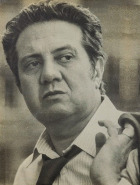

Some of the ideals and influences he absorbed during this time likely led him to join the Portuguese Communist Party (PCP) in 1942. Soares himself noted that the party deeply appealed to him, particularly its “call to action,” meaning its emphasis on political activism ( Nosty, Mário Soares. Um combatente do socialismo [Mário Soares: A Socialist Fighter], 1975, p. 24). He took on academic and political roles aligned with the party's agenda, notably within the University Movement of Communist Youth (1944–45) and the MUD Juvenil [Youth Democratic Movement] (1945–48). He also participated in the 1945 university strike and the demonstrations celebrating the Allied victory in World War II. After his arrest in 1949, Soares claimed he had planned to distance himself from the PCP, citing ideological disagreements during a period when the party label l ed certain members as "opportunists." Among them was Soares, marking the moment of his break with the Communist Party ( Memória Viva… [Living Memory…], 2003, pp. 49–50).
His participation in General Norton de Matos's presidential campaign was, in his view, a turning point. It brought him into contact with prominent opposition figures such as Mário de Azevedo Gomes, António Sérgio (whom he regarded as the great mentor of his generation), Bento de Jesus Caraça, and Jaime Cortesão. He also served as an intermediary between the PCP and the general’s campaign. However, after openly disclosing his party affiliation to Norton de Matos, Soares was promptly removed from the campaign amid heightened tensions.
Mário Soares's political journey significantly prolonged his university studies, extending his course to nine years. It was only in 1950 that he presented his first undergraduate dissertation, titled Teófilo Braga – Tentativa de Determinação do Seu Pensamento Político [Teófilo Braga – An Attempt to Define h is Political Thought]. In this work, he sought to understand and structure the ideas of this historic republican figure. However, Soares himself acknowledged that the study was of a general and introductory nature, not a definitive analysis of Braga's political and ideological thought. He also pointed out the scarcity or complete lack of studies on 19th-century Portugal, encompassing key figures, events, and the ideological currents—both domestic and foreign— that shaped the nation's thinking during that "forbidden century" under the Estado Novo .
This work is financed by national funds through FCT - Foundation for Science and Technology, I.P, in the scope of the projects UIDB/04311/2020 and UIDP/04311/2020.
